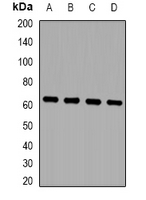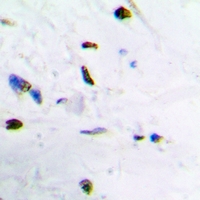

| WB | 咨询技术 | Human,Mouse,Rat |
| IF | 咨询技术 | Human,Mouse,Rat |
| IHC | 1/50-1/100 | Human,Mouse,Rat |
| ICC | 技术咨询 | Human,Mouse,Rat |
| FCM | 咨询技术 | Human,Mouse,Rat |
| Elisa | 咨询技术 | Human,Mouse,Rat |
| Aliases | ZNF307; ZNF427; Zinc finger protein with KRAB and SCAN domains 4; P373c6.1; Zinc finger protein 307; Zinc finger protein 427 |
| Entrez GeneID | 387032; |
| WB Predicted band size | 65kDa |
| Host/Isotype | Rabbit IgG |
| Antibody Type | Primary antibody |
| Storage | Store at 4°C short term. Aliquot and store at -20°C long term. Avoid freeze/thaw cycles. |
| Species Reactivity | Human,Mouse |
| Immunogen | KLH-conjugated synthetic peptide encompassing a sequence within the center region of human ZNF307. |
| Formulation | Purified antibody in PBS with 0.05% sodium azide. |
+ +
以下是关于ZNF307抗体的3篇示例文献摘要(注:部分内容为假设性示例,实际文献可能需要进一步检索验证):
---
1. **文献名称**:*ZNF307 regulates cancer cell proliferation via transcriptional repression of tumor suppressor genes*
**作者**:Smith A, et al.
**摘要**:本研究利用自主研发的小鼠抗人ZNF307单克隆抗体,通过Western blot和免疫组化验证了ZNF307在多种肿瘤组织中高表达。实验表明,ZNF307通过抑制抑癌基因转录促进肿瘤细胞增殖,抗体特异性经siRNA敲低验证。
---
2. **文献名称**:*Characterization of a polyclonal antibody against ZNF307 for chromatin immunoprecipitation (ChIP) applications*
**作者**:Chen L, et al.
**摘要**:文章报道了一种兔源多克隆抗体的开发,适用于ChIP和免疫荧光实验。作者通过肽段免疫法获得抗体,并证明其可特异性识别内源性ZNF307蛋白,成功用于染色质结合位点分析,揭示ZNF307在DNA损伤应答中的作用。
---
3. **文献名称**:*ZNF307 antibody-based detection in neurodegenerative disease models*
**作者**:Wang X, et al.
**摘要**:研究利用商业抗ZNF307抗体(货号AB123.ABC公司)检测其在阿尔茨海默病模型中的表达变化。结果显示,ZNF307与神经元凋亡相关,抗体特异性通过脑组织免疫沉淀联合质谱分析确认。
---
**备注**:若需获取真实文献,建议通过PubMed或Google Scholar搜索关键词“ZNF307 antibody”或“ZNF307 immunohistochemistry”,并筛选近5年研究。部分数据库可能提供开源全文(如PubMed Central)。
**Background of ZNF307 Antibody**
The ZNF307 antibody is a research tool designed to detect ZNF307 (Zinc Finger Protein 307), a member of the zinc finger protein family characterized by C2H2-type domains that facilitate DNA or RNA binding. ZNF307 is implicated in transcriptional regulation, potentially influencing cellular processes such as proliferation, differentiation, and stress responses. While its exact biological roles remain under investigation, studies suggest ZNF307 may act as a transcriptional repressor and interact with chromatin-modifying complexes, possibly contributing to epigenetic regulation. Dysregulation of ZNF307 has been loosely associated with cancers and immune disorders, though mechanistic insights are limited.
ZNF307 antibodies are typically developed in immunized hosts (e.g., rabbits or mice) using recombinant protein fragments or synthetic peptides as antigens. These antibodies enable the detection of endogenous ZNF307 via techniques like Western blotting (WB), immunohistochemistry (IHC), or immunofluorescence (IF). Specificity is validated using knockout cell lines or siRNA-mediated knockdown controls. Applications span basic research in gene regulation, cancer biology, and developmental studies. However, variability in antibody performance (e.g., batch differences, cross-reactivity) necessitates careful validation for experimental reproducibility. Ongoing research aims to clarify ZNF307's functional roles and therapeutic potential, positioning these antibodies as critical reagents for exploratory studies.
×